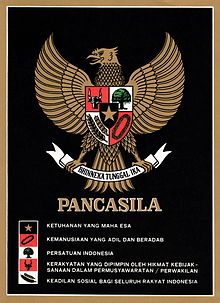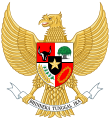
Back بانتشاسيلا (سياسة) Arabic Pançasila fəlsəfəsi Azerbaijani Pancasila BAN Pancasila BCL Pancasila BEW Pancasila BJN Pancasila German Πανκασίλα Greek Pancasila Spanish پانچاسیلا Persian

| This article is part of a series on the |
| Politics of Indonesia |
|---|
 |
Pancasila (Indonesian: [pantʃaˈsila] ) is the official, foundational philosophical theory of Indonesia. The name is made from two words originally derived from Sanskrit: "pañca" ("five") and "śīla" ("principles", "precepts").[1]
It is composed of five principles:
- Ketuhanan yang Maha Esa (Belief in the one and only God)[note 1]
- Kemanusiaan yang adil dan beradab (Just and civilized humanity)
- Persatuan Indonesia (The unity of Indonesia)
- Kerakyatan yang dipimpin oleh hikmat kebijaksanaan dalam permusyawaratan/perwakilan (Democracy guided by the inner wisdom in the unanimity arising out of deliberations among representatives)
- Keadilan sosial bagi seluruh rakyat Indonesia (Social justice for all the people of Indonesia)
The legal formulation of Pancasila is contained in the fourth paragraph of the preamble of the Constitution of Indonesia.
- ^ Kosky (Ed) 1999, p. 43.
- ^ Arief Hidayat 2017.
Cite error: There are <ref group=note> tags on this page, but the references will not show without a {{reflist|group=note}} template (see the help page).